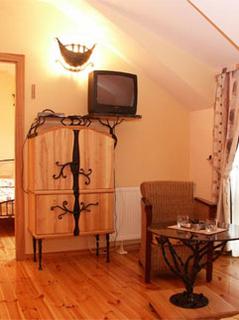Real interest rates mean great returns on the Hungarian forint
Published:
14 April 2004 y., Wednesday
Around the globe, people are looking at Hungary’s real interest rates. With consumer prices up 6.6% year-on-year in January and short-term interest rates close to 12%, there is no other emerging market that offers a better real return on your money.
Massive capital inflows confirm that there is indeed an opportunity. Hot money has pushed up the Hungarian forint to less than Ft 250 per euro. This was the level at which the forint was traded before a flow of adverse macroeconomic data and confused central bank statements drove the currency to its bottom level of over Ft 270 per euro during the second half of 2003.
Is it still worthwhile changing your humble savings into Hungarian forints to benefit from these high interest rates? The answer depends on the exchange rate at which you will convert your money back into your home currency at the end of the day.
Let us suppose you have Ђ100,000 to invest. You can invest it in T-bills from EU countries, giving you a return of around 2%. Alternatively, you change your Ђ100,000 into forints at a rate of Ft 248 and buy Hungarian T-bills for around Ft 24.8 million. This will render you a yield to maturity just below 12%, so that at the end of the year you will own around Ft 27 million.
Provided that you can change your money back into euros at the same rate, you would increase the yield on your investment sixfold compared to investing in euro T-bills! (from 2% to 12%). The problem is that you don’t know the future exchange rate. It is possible, however, to sell the whole amount on the futures market, but only at a rate of Ft 263. Hedging would cost you as much as you would gain from the interest rate differential. Alas, no free lunch.
More interesting returns are available if you’re willing to take a bet on the Hungarian forint. If you’re confident that the forint will stay firm below Ft 263 per euro until the end of December, there is no need to hedge your forint exposure. Is there any reason to be confident about this?
There are, in my opinion, two reasons that make it unlikely that the National Bank of Hungary (MNB) will let the forint depreciate again below a level of around Ft 263 per euro. The first reason is obvious, the second reason more complex in nature.
Šaltinis:
bbj.hu
Copying, publishing, announcing any information from the News.lt portal without written permission of News.lt editorial office is prohibited.
The most popular articles
 On 31 August 2009 in a non-public way AB Bank SNORAS issued the emission of perpetual debt securities included into the bank capital amounting to LTL 72.5 million.
more »
On 31 August 2009 in a non-public way AB Bank SNORAS issued the emission of perpetual debt securities included into the bank capital amounting to LTL 72.5 million.
more »
 The European Commission, through its longstanding cooperation with the US and Canada, announces the launch of 33 new and innovative projects involving universities and training institutions on both sides of the Atlantic.
more »
The European Commission, through its longstanding cooperation with the US and Canada, announces the launch of 33 new and innovative projects involving universities and training institutions on both sides of the Atlantic.
more »
 Today at the VII World Congress on Alternatives and Animal Use in the Life Sciences in Rome, the European Commission and the European cosmetic industry presented their joint financial effort for research into alternative safety testing methods.
more »
Today at the VII World Congress on Alternatives and Animal Use in the Life Sciences in Rome, the European Commission and the European cosmetic industry presented their joint financial effort for research into alternative safety testing methods.
more »
 SEB Bank, the largest bank in Lithuania, invests almost LTL 4.6 million in to the upgrade of its data transmission network.
more »
SEB Bank, the largest bank in Lithuania, invests almost LTL 4.6 million in to the upgrade of its data transmission network.
more »
 The World Bank’s Board of Executive Directors today approved a credit of US$ 36.6 million equivalent of additional financing for the Lifeline Road Improvement Project for Armenia.
more »
The World Bank’s Board of Executive Directors today approved a credit of US$ 36.6 million equivalent of additional financing for the Lifeline Road Improvement Project for Armenia.
more »
 The Executive Board of the International Monetary Fund (IMF) today completed the first review of Latvia's performance under an economic program supported by a 27-month Stand-By Arrangement.
more »
The Executive Board of the International Monetary Fund (IMF) today completed the first review of Latvia's performance under an economic program supported by a 27-month Stand-By Arrangement.
more »
 The Commission has today decided to close the formal investigation procedure into the privatisation and restructuring of Austrian Airlines concluding that the restructuring following its sale to Lufthansa is compatible with community law.
more »
The Commission has today decided to close the formal investigation procedure into the privatisation and restructuring of Austrian Airlines concluding that the restructuring following its sale to Lufthansa is compatible with community law.
more »
 Ben Bernanke's reappointment as head of the Federal Reserve did not come as a surprise, but Wall Street still responded with the proverbial thumbs up.
more »
Ben Bernanke's reappointment as head of the Federal Reserve did not come as a surprise, but Wall Street still responded with the proverbial thumbs up.
more »
 Over I half-year 2009 accommodation establishments had by 22 per cent less guests.
more »
Over I half-year 2009 accommodation establishments had by 22 per cent less guests.
more »
 In the first such transaction in Russia, carbon credits generated by utilising gas which would otherwise be flared at an oilfield in eastern Siberia are to be purchased through a carbon fund set up by the EBRD and the European Investment Bank (EIB), the Multilateral Carbon Credit Fund (MCCF).
more »
In the first such transaction in Russia, carbon credits generated by utilising gas which would otherwise be flared at an oilfield in eastern Siberia are to be purchased through a carbon fund set up by the EBRD and the European Investment Bank (EIB), the Multilateral Carbon Credit Fund (MCCF).
more »